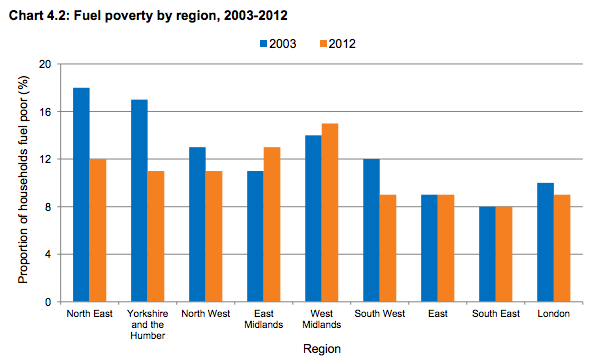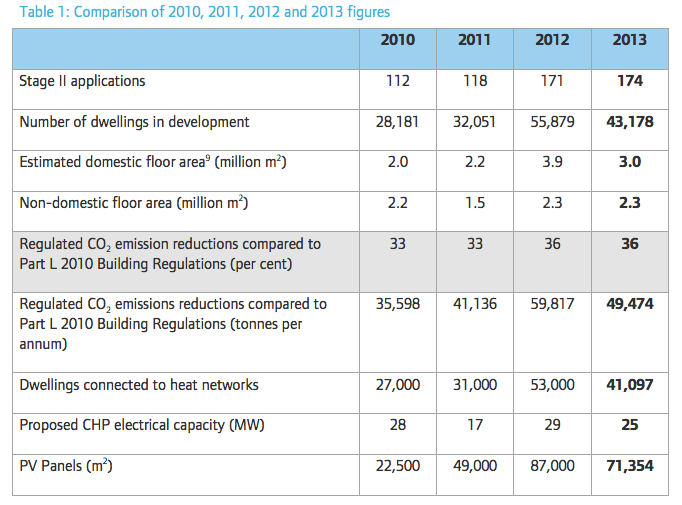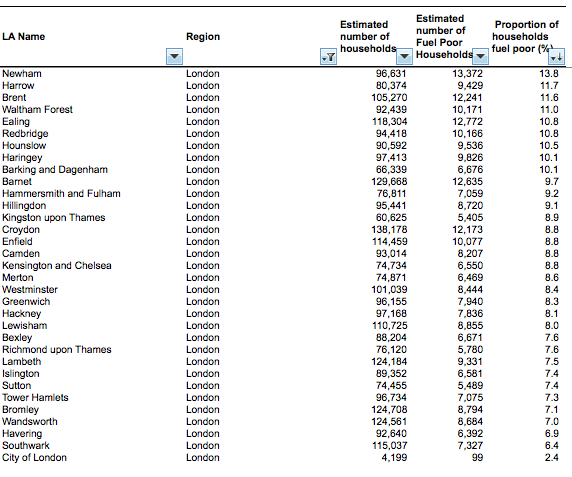Site search:
-
What’s new?
Energy for London Tags
Brent Buildings Camden Carbon Emissions CHP Cities Climate Adaptation Community Heating Community Initiatives Croydon Data DECC Decentralised Energy Distribution ECO Energy Costs Energy Efficiency Enfield FIT Fuel Poverty Funding Green Deal Hackney Haringey Housing Islington Lambeth Library Local Authorities Mayor Newham Ofgem Olympics Photovoltaics Planning RE:FIT RE:NEW Renewable Energy Retrofit Southwark Tower Hamlets Transport Waltham Forest Waste WestminsterEnergy Archives:
- February 2021 (1)
- January 2021 (15)
- December 2020 (15)
- November 2020 (9)
- October 2020 (3)
- August 2020 (5)
- July 2020 (3)
- June 2020 (4)
- April 2020 (10)
- March 2020 (5)
- February 2020 (2)
- January 2020 (3)
- October 2019 (1)
- September 2019 (4)
- August 2019 (2)
- July 2019 (1)
- August 2018 (1)
- November 2016 (8)
- October 2016 (8)
- September 2016 (2)
- August 2016 (8)
- July 2016 (14)
- April 2016 (12)
- March 2016 (16)
- February 2016 (8)
- January 2016 (4)
- December 2015 (1)
- November 2015 (1)
- October 2015 (16)
- September 2015 (3)
- June 2015 (1)
- May 2015 (1)
- April 2015 (1)
- March 2015 (1)
- February 2015 (1)
- January 2015 (1)
- December 2014 (18)
- November 2014 (4)
- August 2014 (8)
- July 2014 (7)
- June 2014 (25)
- May 2014 (8)
- April 2014 (4)
- March 2014 (12)
- February 2014 (7)
- January 2014 (13)
- December 2013 (11)
- November 2013 (15)
- October 2013 (15)
- September 2013 (18)
- August 2013 (5)
- July 2013 (20)
- June 2013 (33)
- May 2013 (8)
- April 2013 (16)
- March 2013 (25)
- February 2013 (14)
- January 2013 (20)
- December 2012 (23)
- November 2012 (23)
- October 2012 (25)
- September 2012 (14)
- July 2012 (12)
- June 2012 (43)
- May 2012 (20)
- April 2012 (8)
- March 2012 (40)
- February 2012 (39)
- January 2012 (40)
- December 2011 (22)
- November 2011 (40)
- October 2011 (33)
- September 2011 (48)
- August 2011 (40)
- July 2011 (58)
- June 2011 (41)
- May 2011 (80)
- April 2011 (38)
- March 2011 (33)
- February 2011 (25)
- January 2011 (24)
- December 2010 (3)
- November 2010 (7)
- October 2010 (6)
- September 2010 (7)
- August 2010 (1)
- July 2010 (2)
- June 2010 (4)
- May 2010 (1)
- March 2010 (3)
- February 2010 (3)
- December 2009 (5)
- November 2009 (2)
- October 2009 (3)
- July 2009 (3)
- June 2009 (1)
- April 2009 (1)
- March 2009 (1)
- February 2009 (1)
- January 2009 (1)
- December 2008 (2)
- October 2008 (1)
- September 2008 (1)
- July 2008 (1)
- March 2008 (2)
- January 2008 (2)
- October 2007 (1)
- September 2007 (3)
- July 2007 (1)
- March 2007 (1)
- February 2007 (3)
- November 2006 (3)
- August 2006 (1)
- February 2006 (1)
- May 2005 (1)
- February 2004 (1)
Monthly Archives: June 2014
London Plan spurs on carbon savings in new developments
30 June 2014: The latest annual assessment report of energy and carbon savings secured through the Mayor’s planning requirements has just been published by the GLA.
An energy assessment is required for each planning application referable to the Mayor, setting out how the London Plan energy policies will be met within the development. Specifically, applicants are required to set out how the planning applications apply the following energy hierarchy: Be lean: use less energy / Be clean: supply energy efficiently / Be green: use renewable energy. Further information on the London Plan energy policies can be viewed here.
The report provides an overview of the number of developments that have been approved by the Mayor and boroughs for planning, and importantly, the extent that these developments have committed to the use of sustainable energy solutions to help reduce their carbon and energy impact. The report summarises that – in 2013 alone – the London Plan’s energy policies have supported:
- circa £17 million of investment in combined heat and power (CHP) plant able to produce 25MW of electricity and a similar amount of heat – broadly equivalent to the amount required to supply 50,000 homes.
- around £103 million of investment in heat network infrastructure for circa 41,000 communally heated dwellings
- £13 million in photovoltaic panels and additional investment in other renewable energy technologies
- Regulated CO2 emission reductions of 36 per cent more than required by Part L 2010 of the Building Regulations. This represents a circa 30 per cent regulated CO2 reduction compared to the new 2013 Building Regulations (ie London Plan policies are already directing developers to energy strategies delivering 30% more CO2 savings above the government’s new building regulation requirements, which came into operation in April 2014).
Also provided is a summary of what has been secured over each of the past 4 years as a result of the London Plan’s energy policies.
This highlights that potentially:
- More than 150,000 new dwellings will be connected to district heating networks in London
- Close to 100 MW of CHP capacity has been secured
- And over 230,000 m2 of PV is to be installed.
Energy People and Society presentations
24 June 2014: A series of interesting papers presented at the first UCL symposium on energy, people and society include a number of case studies focused in London, which include:
- District Heating in Pimlico: Analysing the social contract created through energy infrastructure available here.
- Capturing the Social Value of Retrofit at Scale (a case study in Poplar) available here
- Heritage and Environmental Values in Sustaining Heritage Domestic Buildings: A Residents’ Perspective (case study in Walthamstow) available here
- Greenroofs and Sustainability: Energy, Performance, Time (case studies across London) available here
- Urban Energy Landscapes available here
Posted in Decentralised Energy, News
Tagged Climate Adaptation, Community Heating, Retrofit, Tower Hamlets, Waltham Forest, Westminster
Leave a comment
Slam Climate Change
June 2014: An interesting report in Independent that:
“…scientists are being told to use art and poetry to win public support in the battle to curb climate change. Dame Julia Slingo, the chief scientist at the Met Office, has called for a radical overhaul of the way climate scientists go about their business, arguing that they need to make their reports less turgid and more engaging.
“We have to look increasingly at what society requires of us… We increasingly recognise that to reach the general public we have to use all sorts of different channels of communication,” Dame Julia told a recent gathering of leading climate change scientists at the University of Exeter.
“And it’s not through tables and graphs. Sometimes it is through art, through music, through poetry, and storytelling and that is increasingly something we have to think about – how we communicate in a more humanist way.”
With this in mind, its interesting to see that an event took place over the weekend in Hackney, as part of a programme called The Spark, entitled ‘Using hip-hop and music to empower communities and tackle Climate Change’, and earlier this year the Grantham Research Institute on Climate Change held a novel poetry slam ‘Rhyme & Reason: Reflections on Climate Change‘ evening (poster below), performances from which can be seen here – and additional details of the night here.
Vulnerability of London’s Economy to Climate Change
June 2014: Academic research from 2013 examining a model “developed to explore the sensitivity of the London economy to loss of production capacity in sectors affected by climate change related damage.” The paper is fully downloadable here.
London Fuel Poverty Statistics
June 2014: DECC have just released their 2014 Annual Fuel Poverty Statistics Report, accompanied by a dizzying number of data sets (all for 2o12), which attempt to detail fuel poor households by housing type, who lives there, by region etc.etc. The headlines of all this work is that government estimate that, in 2012, absolute numbers of fuel poor households had fallen slightly, when compared to previous years, to approximately 10% of all households in England. The overall change in the number of households in fuel poverty was relatively small – with the reduction happening mainly due to income increases for higher income fuel poor households. However, it’s also reported that the number of households in fuel poverty is projected to increase in 2014, with increases in energy costs a key factor.
Key findings include:
- The importance of energy efficiency: households are far less likely to suffer fuel poverty if they live in a better insulated home
- The much higher incidences of fuel poverty in unemployed households, and those living in privately rented accommodation.
Though the data indicates a lower proportionof fuel poor households in London than other regions (attributed in the report to higher incomes in London and greater access to the gas grid) the findings above are of particular importance to the capital due to the high (and increasing) number of households living in the privately rented sector, and the much lower levels of activity achieved by the government’s energy efficiency programmes in London.
The recent changes adopted by government in how to define when a household is in fuel poverty (as set out in the government’s 2013 ‘Fuel Poverty: A Framework for Action) – under a new ‘Low Income Household Costs’ (LIHC) indicator – specifically takes housing costs into account for the first time. Not surprisingly, this was thought to have a significant impact to the numbers of fuel poor in London due to the higher housing costs observed in the capital – with a predicted near 50% increase in the number of fuel poor households (see here for details). The Fuel Poverty report doesn’t however appear to provide any commentary on how differences between regional housing cost differences may have impacted on fuel poverty numbers.
 Though the proportion of fuel poor households in London is estimated to be lower than most other regions it can also be seen from graph above (copied from the report) that London has seen a much smaller drop across the decade in the number of fuel poor homes than other regions.
Though the proportion of fuel poor households in London is estimated to be lower than most other regions it can also be seen from graph above (copied from the report) that London has seen a much smaller drop across the decade in the number of fuel poor homes than other regions.
The key data breakdown for London is set out in a separate spreadsheet document – the ‘2012 sub-regional fuel poverty data: low income high costs indicator‘. The data includes a local authority breakdown of data and reports that Newham has the highest incidence of fuel poverty in London with close to 1 in 7 homes deemed to be fuel poor, followed by Harrow, Brent and Waltham Forest.
Table 3 of the dataset breaks down the local authority data further to ‘Lower Super Output Area’. Data on fuel poor households by London Parliamentary constituencies is also provided.
‘Fuel Poverty Trends 2003-12’ provides long term trends under the new Low Income High Costs (LIHC) indicator including a time series on number of households estimated to be fuel poor. The data for London is copied below and indicates that the proportion of London households in fuel poverty initially dipped in the early party of the century, but has increased again, hitting a maximum of 13.2% in 2010, before falling again slightly.
The ‘Fuel Poverty Detailed Tables‘ provide limited regional information, but provided data on fuel poverty by housing type, age of residents, age of dwelling, energy efficiency of dwelling, working status, tenure etc. An additional indicators note is also available here.
Fuel Poverty by London constituencies
June 2014: The number of fuel poor households ranked by London Parliamentary constituencies, as set out in DECC’s latest ‘2012 sub-regional fuel poverty data: low income high costs indicator‘ dataset, is provided below:
Risks of Climate Change to the London Economy
June 2014: Interesting to note that the London Assembly Economic Committee are to hold an evidence session on 24 June 2014 at City Hall on ‘Risks of Climate Change to the London Economy’.
The meeting is to take place at 10.00am in Committee Room 5 . This is the first meeting for the Economy Committee’s new investigation into the resilience of London’s economy to the projected impacts of climate change on the city. A briefing paper drafted for members of the committee can be downloaded here.
The proposed terms of reference for the Committee’s investigation are:
- To map the likely effects of climate change on the London Economy; identifying the sectors most at risk and the likely effects on jobs and prosperity;
- To establish best practice amongst the business community, in terms of risk assessment and adaptation strategies; and
- To make recommendations addressing the risks from climate change to the London economy to the London Enterprise Panel and the Mayor, and potentially other representatives of London Government where appropriate.
Guests include:
- Nick Beecroft, Lloyd’s of London
- Daniel Dowling, PricewaterhouseCoopers
- Professor Samuel Fankhauser, Grantham Institute for Climate Change and the Environment
- Michelle Hubert, Confederation of British Industry
- Professor Christopher Rapley CBE, London Climate Change Partnership
The Mayor has previously stated that TfL has extreme weather resilience action plans for each business area. London’s 2011 Climate Change Adaptation Strategy can be viewed here.
Details of Urban Community Energy Fund emerge
June 2014: DECC have issued a tender to appoint an administrator for their recently announced £10m Urban Community Energy Fund (details of which are outlined in an earlier post here). The tender seeks to procure a contractor to set up and manage the Fund until 2018, with the possibility of an extension, and sets out a list of requirements including:
- The contractor will be required to develop a mechanism for administering the repayment of loans from the Fund
- Should have ability to provide advice to applicants to the Fund
- Show an understanding of the energy technologies covered by the Fund
- Develop a digital service (website) for users of the Fund
- Develop supporting material, for example application forms, for the Fund
- and do all this to in time for the Fund go-live in September 2014 [with the Fund likely to be launched by Ministers at the Local Authorities and Communities Conference organised by DECC and Oxford City Council, which is to be held on 4 September. This conference will be followed by the Community Energy Awards – details here].
- The deadline date for organisations to apply to the tender is 21 July 2014.
The tender sets out that applicants to the Fund will need to:
- Show the organisation is a community group as defined within the fund (the exact criteria of which is to be confirmed); and
- Submit a business case related to the project that are requesting funds for, with this business case to be assessed by the fund administrator.
A recent presentation by the Head of DECC’s Community Energy Team (at an event held on 11 June launching the results of the Kingston smart communities project) provides some additional background to work being undertaken to support the uptake of community energy.
40 ESCO deals signed through RE:FIT programme
June 2014: A response by the Mayor to a question this month provides details that, of the 125 public sector organisations working with the RE:FIT programme, 40 have so far signed energy service deals through the GLA’s RE:FIT procurement framework. Local authorities signed up to RE:FIT include Harrow, Ealing, Sutton, Enfield, Merton and Camden. A full list of the 40 organisation is provided here (though, confusingly, a few organisations are mentioned more than once – so not it’s not clear if the list is less than 40 – or these organisations have signed more than one deal with an ESCO partner…?).
Posted in Energy Efficiency, News
Tagged Brent, Buildings, Camden, Ealing, Enfield, Hammersmith and Fulham, Harrow, Kingston, Merton, Newham, RE:FIT, Richmond, Sutton, Waltham Forest
Leave a comment
Wembley District Heating Monitoring Trial
June 2014: Interesting news story that “A pilot project by Octavia Housing is helping landlords re-think how they deliver heat and tackle fuel poverty in thousands of social housing properties across the UK supplied by low carbon district heating systems, by allowing them to monitor system performance and energy use in real-time.”
“The London-based housing association, which owns and manages 4,000 homes, has teamed up with green energy specialist Guru Systems for the project, which will use the company’s pioneering smart metering system to monitor how efficiently the district heating system is working at the flagship Elizabeth House development in the heart of Wembley.”
Read the full story here.
Supporting the Community Energy Strategy in London
June 2014: The Mayor has responded to a three questions this month on the Government’s recent Community Energy Strategy stating that:
- “I welcome the publication of the Strategy and the establishment of the Community Urban Energy Fund and will look at how, through our existing programmes and activities, we could support London based organisations to access the scheme.”
- He will consider how the London Energy Efficiency Fund (LEEF) can potentially compliment the Community Energy Strategy’s Urban Energy Fund
- His advisor and officers have already started meeting a few community energy groups operating in London.
The government’s £10m Urban Community Energy Fund (UCEF) will provide up to approximately £150,000 of funding for feasibility and pre-planning development work to help projects become investment ready. The funding will be available in two stages:
- Stage one will be a grant of up to approximately £20,000 for feasibility of renewable energy projects.
- Stage two will be a loan of up to approximately £130,000 to support pre-planning development work, planning applications and to develop robust business cases to attract further development.
Details of the Fund have as yet not been fully announced by DECC as yet, but a new Community Energy Unit has been established in DECC and will be leading on its delivery.
Posted in Decentralised Energy, News, Renewable Energy
Tagged Community Initiatives, DECC
Leave a comment
Energy and Climate Questions to the Mayor
June 2014: This month the Mayor has been asked questions in relation to:
Energy efficiency in the private rented sector; carbon offsets used by new developments;
How much energy is produced in London by decentralised energy systems;
heat recovery from London’s buildings; meetings with London community energy groups; total spend by the Mayor on domestic energy efficiency programmes;
Mayoral action following the publication of the government’s Community Energy Strategy; energy companies supporting the Mayor’s License Lite application;
progress against the Mayor’s decentralised energy target; the government’s new Urban Energy Fund; money spent by the London Energy Efficiency Fund (LEEF);
hospitals using the Mayor’s RE:FIT programme; visits to the Kingston heat pump development; visits to the London Array Wind Farm; Ofgem approval of the Mayor’s License Lite application; local authorities using RE:FIT; the Mayor’s first license lite supply deal; feedback from the C40 Johannesburg summit; consumer redress to high heat charges on district heating networks;
ESCO deals signed under the Mayor’s RE:FIT programme; Mayoral support for the Green Deal in London’; Green Deal Communities Fund; costs associated with applying to DECC’s Green Deal Communities Fund; green jobs created by Mayoral programmes;
low carbon sector jobs created; attracting green investment into London; the Mayor’s High Level Electricity Working Group;
Previous months questions to the Mayor can be found here.
Posted in News
Tagged Community Initiatives, Decentralised Energy, ECO, Energy Efficiency, Green Deal, Kingston, London Green Fund, RE:FIT, RE:NEW, Wind
Leave a comment





